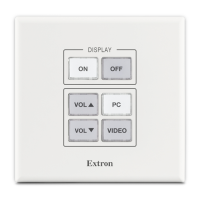MLC Plus 50/100/200 Series • Glossary 48
TCP (Transmission Control Protocol)
A connection-oriented protocol at the Transport layer of the Open Systems Interconnection
(OSI, ISO/IEC 7498-1) reference model. It provides reliable end-to-end data delivery from
one network device to another.
TCP/IP (Transmission Control Protocol/Internet Protocol)
The communication protocol of the Internet. Computers and devices with direct access
to the Internet are provided with a copy of the TCP/IP program to allow them to send and
receive information in an understandable form.
UDP (User Datagram Protocol)
A connectionless, Internet transport layer protocol that sends packets (datagrams) of
information across networks using “best-effort” delivery. It is a relatively simple protocol that
does not include handshaking. It is faster than TCP and is often used for broadcast and
multicast communication, but it does not include data verification to ensure that all packets
arrived at their destination.
URL (Uniform Resource Locator)
The address (such as www.extron.com) that lets a resource on the internet be identified,
located, and accessed.

